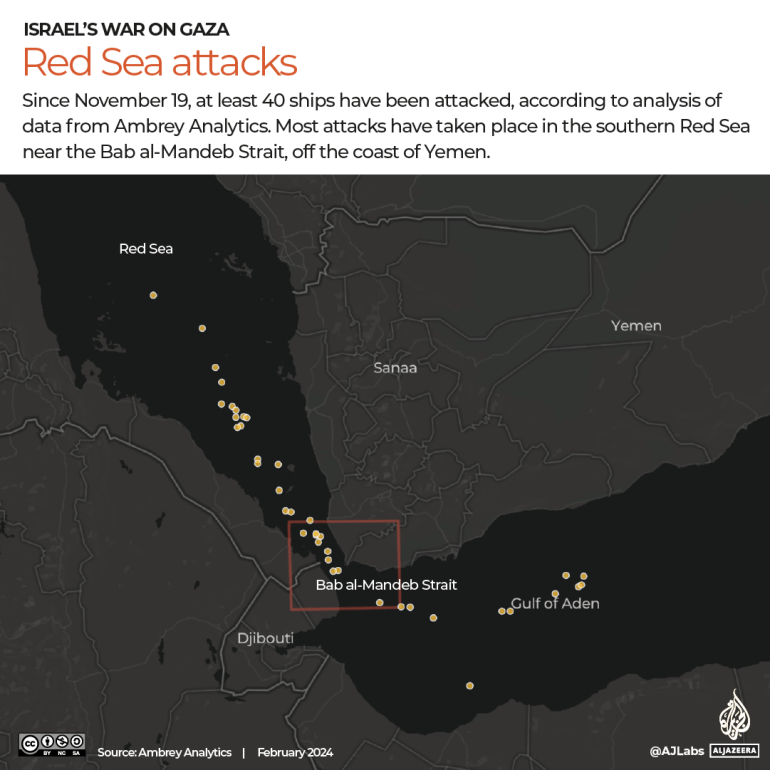US warns of ‘disaster’ amid oil slick in Red Sea from ship hit by Houthis
US military says Iran-aligned group is being reckless with attacks on shipping in the Red Sea off Yemen’s shores.
The United States military has warned of an “environmental disaster” after an attack by Yemen’s Houthi rebels on a cargo ship caused an oil slick in the Red Sea.
The Iran-aligned group hit the United Kingdom-owned, Belize-flagged bulk carrier Rubymar on February 18 with multiple missiles. It was sailing through the Bab al-Mandeb Strait which connects the Red Sea and the Gulf of Aden, on its way to Bulgaria after leaving Khor Fakkan in the United Arab Emirates.
Extensive damage prompted the crew, all of whom are safe, to abandon the ship.
US Central Command (CENTCOM) confirmed on Saturday that the ship was now “anchored but slowly taking on water”, which it said has caused a 29-kilometre (18-mile) oil slick.
The vessel was transporting more than 41,000 tonnes of fertiliser when attacked, the military said, “which could spill into the Red Sea and worsen this environmental disaster”.
“The Houthis continue to demonstrate disregard for the regional impact of their indiscriminate attacks, threatening the fishing industry, coastal communities, and imports of food supplies,” it added.
On Feb. 18 between 9:30 p.m. and 10:40 p.m., Iran-backed Houthi terrorists attacked the M/V Rubymar, a Belize-flagged, UK-owned bulk carrier. The ship is anchored but slowly taking on water. The unprovoked and reckless attack by Iran-backed Houthi terrorists caused significant… pic.twitter.com/bU6j850wwG
— U.S. Central Command (@CENTCOM) February 24, 2024
US broadcaster CNN cited an unnamed US official as saying the threat of more Houthi attacks in the Red Sea, combined with the condition of the water, makes it very difficult to safely get to the ship and attempt to tow it to a port. US officials are not sure what kind of substance is causing the slick, the report said.
The group has been disrupting trade through the Red Sea, promising that its attacks will continue until Israel ends its war on Gaza, which has killed more than 29,600 Palestinians, mostly children and women.
Backed by several other allied Western governments, the US and the United Kingdom have been bombing governorates across Yemen in response to the Houthi strikes. The military confrontation has now turned into a daily occurrence.
The US military also confirmed multiple new “self-defence strikes” on Houthi-controlled positions in Yemen. It said it destroyed seven mobile antiship cruise missiles that were prepared for launch towards the Red Sea.
“These actions will protect freedom of navigation and make international waters safer and more secure for US Navy and merchant vessels,” CENTCOM said.

The Houthis, who control Yemen’s most populous regions, earlier this week struck what they said was an Israeli cargo ship, the MSC Silver, in the Gulf of Aden near the entrance to the Red Sea.
Houthi military spokesperson Yahya Saree said the group had also used drones to target a number of US warships in the Red Sea and Arabian Sea as well as sites in the southern Israeli resort town of Eilat.
US media cited US officials as confirming earlier this week that the Houthis had hit an MQ-9 attack drone near Yemen, the second time they have shot down a US military drone since the start of the Gaza war.
Houthi leader Abdulmalik al-Houthi on Thursday said they have introduced “submarine weapons” in their attacks. This confirms a previous US military report that the group is deploying underwater drones.
A Houthi spokesperson has said the group has recruited and trained more than 200,000 new fighters since the start of the Gaza war.




